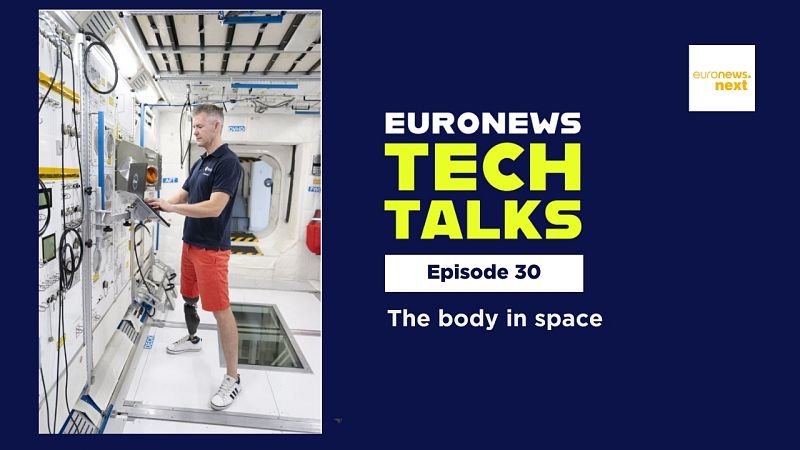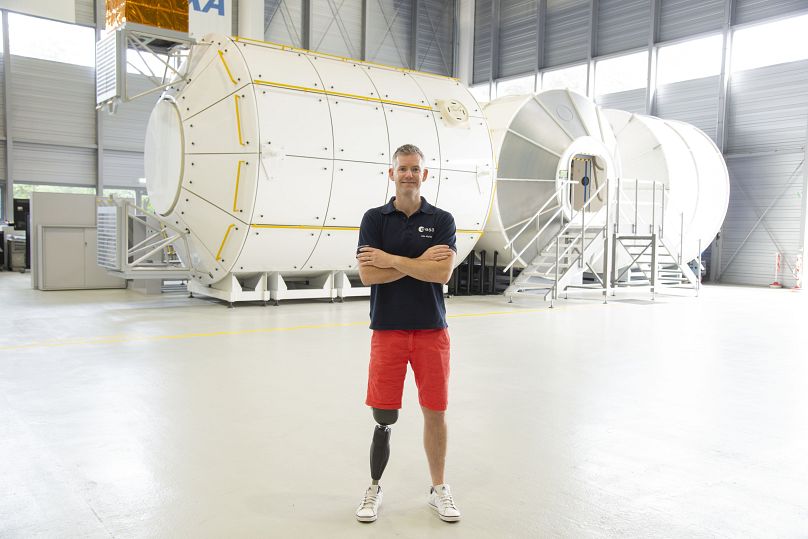How the first astronaut with a disability is preparing to travel into space | Euronews Tech Talks

John McFall is the subject matter expert for a European Space Agency study aimed at fully integrating an astronaut with a physical disability into a long-duration mission to the International Space Station.
He is also the first world's astronaut candidate with a physical disability.
How people with disabilities will travel to space
In 2000, John McFall’s life took a sharp turn when he lost his leg in a motorcycle accident. But for McFall, a British athlete, surgeon, and now astronaut, the loss became a catalyst for a remarkable journey that would take him from elite sports to the frontiers of space exploration.
In 2008, he won a bronze medal in the 100 metres at the Beijing Paralympic Games and his ambitions didn’t stop there. In 2022, the European Space Agency (ESA) selected him as the first astronaut with a disability. His groundbreaking role as part of the ESA’s Fly! Feasibility Study represents a significant step forward in making space exploration more inclusive.
McFall’s work focuses on determining what is required for astronauts with physical disabilities, like his lower limb amputation, to participate in long-duration space missions.
“Like many kids, I dreamed of astronauts in big white suits floating in space,” McFall said. Now, he’s helping make that dream a reality - not just for himself, but for others with disabilities. As the Subject Matter Expert for the Fly! Study, McFall’s expertise is invaluable in exploring how someone with a prosthetic limb can thrive in the challenging environment of space.
The study has already uncovered significant challenges. Current spacecraft hardware is not designed with disabilities in mind, which means existing safety and emergency protocols must be adapted.
However, McFall is optimistic that future technological innovations will lead to more inclusive space travel.
“We’re looking into new socket technologies that could be more robust and easier to use,” McFall said, expressing hope that such advancements will not only benefit astronauts but improve prosthetics for people on Earth as well.
McFall awaits the day when astronauts with disabilities will routinely travel into space. For him, the success of the Fly! Study will be realised when “someone with a disability returns from space".
And he’s excited about the possibility of being that person.
Milestones in Space Medicine
McFall’s work builds on decades of space medicine research that has explored how space affects the human body. The earliest tests began in the late 1940s when the US and Soviet Union sent animals, like mice, monkeys, and fruit flies, into space to study how biological systems reacted to space conditions.
In 1961, Yuri Gagarin became the first human to orbit the Earth, providing critical data on how microgravity impacts the human body.
Later missions, including the 1969 Apollo moon landing, revealed key insights into how reduced gravity affects muscle atrophy, bone density loss, and cardiovascular health. These findings have directly contributed to medical advancements on Earth, particularly in the treatment of osteoporosis, muscle-wasting diseases, and heart conditions.
The establishment of the International Space Station (ISS) in 2000 marked a new chapter in space medicine. The ISS allows astronauts to live in space for up to a year, providing scientists with an unparalleled opportunity to study the long-term effects of microgravity.
One critical discovery is that microgravity causes significant changes in blood flow, heart function, and fluid distribution. These changes make astronauts’ hearts more spherical and reduce their ability to pump blood efficiently once they return to Earth.
One of the most notable studies conducted on the ISS was the Kelly brothers’ Twin Study.
In this study, astronaut Scott Kelly spent a year in space while his twin brother Mark remained on Earth. Researchers observed changes in Scott’s body, including an unexpected lengthening of his telomeres – protective caps on chromosomes that typically shorten with age and stress.
Most of Scott’s changes reversed upon returning to Earth, but some, particularly in gene expression and vision, lasted longer.
As space agencies continue to push the boundaries of human space exploration, studies like these, and McFall’s work, offer valuable insights into how the human body works also on Earth.
Today








